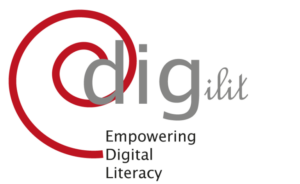Erasmus+ KA204 EMPOWERING Digital Literacy in a Transforming World «DIGILIT»
Promoting digital literacy….
…in a changing world
Digitalization is on everyone’s lips. Artificial intelligence and algorithms, 3D printing, and the use of robots are increasingly influencing life and work, the way we communicate, produce, and make political decisions. But what is meant by digitalization? What social impact will technological change have? Will it further deindustrialization, rising unemployment, and/or create new jobs? New opportunities for information, but also for surveillance, for active participation, but also for incitement to hatred? And how should these developments be shaped by politics?
Adult educators from France, Romania, Spain, and Berlin are exchanging ideas and creating a wiki on the technological, social, and political dimensions of digitalization. It also contains inspirations and methodological suggestions for «analog» learning on this topic.
Digitalization shapes the lives and work of European citizens, the economy, society, and politics. It is often mentioned, but rarely understood. It encompasses: a) technological change through 3D printing, robots, artificial intelligence, algorithms, etc. b) social change through deindustrialization, disruption, unemployment, job creation, the need for new and ongoing skills, and other communication practices, including cyberbullying, lifestyles, and attitudes; c) political change in terms of 1) new forms of mobilization, information, and participation, but also fake news, hacker attacks, and cyberwarfare; 2) a structural change in the public sphere due to social media, blogs, and the diminishing influence of «traditional» media (newspapers, TV); 3) the political strategy to frame digitalization through the establishment of laws and regulations, etc.
Digitalization and the socioeconomic and political transformation of industrial and post-industrial societies is a European challenge. It cannot be «managed» by the state or society alone. Since European countries are connected through the European internal market, it is necessary to develop common strategies to analyze developments, foster critical understanding, and strengthen digital skills. This is also important for adult education. These radical changes pose a challenge for particularly disadvantaged students and parents. Educational offerings will focus on providing appropriate information that reflects issues from a multiperspective perspective. Furthermore, digital learning does not only take place through better use of devices such as smartphones or through the Internet of Things. It also requires a social context (seminars, workshops, etc.) for learning about digitalization.
This project aims to create a wiki on the three dimensions of digitalization described above. It contains both information on the topic and teaching inspirations for trainers to organize shared «analog» learning on these topics. The wiki content will be discussed during transnational project meetings. It would be applied in workshops (LTTA) and local activities, and enhanced at the next transnational project meeting. The workshops will also provide an opportunity to exchange good practices in teaching digitalization to adult learners among project partners.
On our website, we publish a step-by-step guide to what we learned, shared, and produced during the project; you can access it by clicking on this icon:

